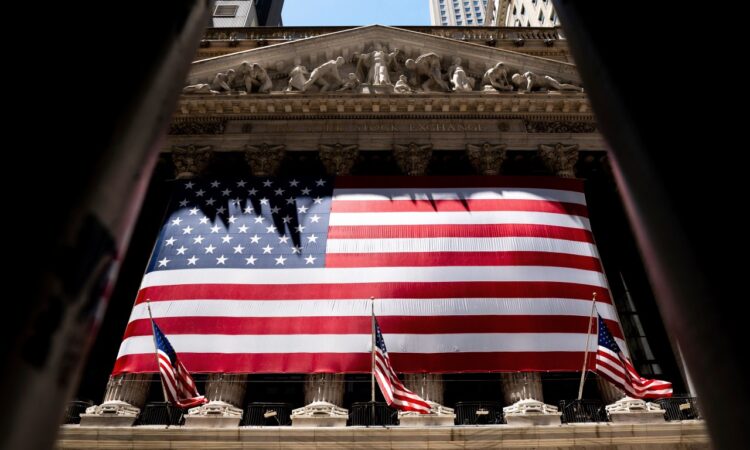Stock market today: Wall Street drifts as the bond market cranks up the pressure and oil prices ease

The American flag is shown at the New York Stock Exchange on Wednesday, June 29, 2022 in New York. Stocks shifted between gains and losses on Wall Street Wednesday, keeping the market on track for its fourth monthly loss this year. (AP Photo/Julia Nikhinson)
NEW YORK (AP) — U.S. stocks are drifting Monday as the constrictor of higher interest rates tightens its coils around Wall Street.
The S&P 500 was 0.2% lower in morning trading, coming off its worst month of the year. The Dow Jones Industrial Average was down 117 points, or 0.4%, at 33,389, as of 10:30 a.m. Eastern time, and the Nasdaq composite was 0.3% higher.
Slumps for oil-and-gas stocks weighed on the market after crude prices gave back some of their sharp gains since the summer. The majority of stocks fell alongside them, but gains for Apple and some other Big Tech stocks helped to limit the market’s losses.
Stocks have broadly given back about 40% of their strong gains for the year since the end of July. The main reason is Wall Street’s growing acceptance that high interest rates are here to stay a while as the Federal Reserve tries to knock high inflation lower. That in turn has pushed Treasury yields to their highest levels in more than a decade, which makes investors less willing to pay high prices for stocks and other investments.
The yield on the 10-year Treasury climbed again Monday, up to 4.65% from 4.58% late Friday, and is near its highest level since 2007.
High yields hit stocks in several ways. They send more investors to bonds that are paying much more than in the past, which pulls dollars away from stocks and undercuts their prices. They also make borrowing more expensive for companies and their customers, which can pressure their profits.
The U.S. dollar’s value has also been climbing against other currencies after the Federal Reserve said it will likely cut interest rates by less in 2024 than it earlier expected. It’s already pulled its main interest rate to the highest level since 2001.
A strong dollar gives a boost to U.S. tourists spending money abroad, but it hurts U.S. companies that sell their products overseas. And for the big companies in the S&P 500 index, that means a huge chunk of revenue.
“If higher-for-longer rates keep the dollar at recent levels, corporate profits will face a genuine headwind,” according to Lisa Shalett, chief investment officer at Morgan Stanley Wealth Management.
The U.S. economy has been holding up overall, defying predictions that it would have fallen into a recession by now. A solid job market and spending by U.S. households has helped keep the economy afloat, despite much higher mortgage rates and other borrowing costs.
Manufacturing has been one area that’s felt the sting of higher rates, and reports on Monday suggested it’s still contracting, though perhaps not by as much as expected.
A report from the Institute for Supply Management said U.S. manufacturing contracted in September for an 11th straight month. More encouraging for Wall Street was that the report also indicated prices were easing in September. That could mean less pressure on inflation, which has been feeling heat recently from fast-rising oil prices.
Crude oil prices were easing Monday but remain much higher for the year.
A barrel of U.S. crude fell 1.6% to $89.37, though it’s up sharply from about $70 during the summer. Brent crude, the international standard, slipped 0.4% to $91.87.
That helped drag Exxon Mobil down 2% and Chevron down 1.6%.
Tesla was another weight on the market, slumping 0.9% after reporting vehicle deliveries for the summer that fell short of analysts’ expectations.
SmileDirectClub plunged 59% to 17 cents after the company that helps people straighten their teeth filed for Chapter 11 bankruptcy protection.
On the winning side of Wall Street, Discover Financial Services jumped 6.7% for the biggest gain in the S&P 500. The company gave details about a consent order it received from the Federal Deposit Insurance Corp, which forces Discover Bank to improve its consumer compliance management system. Analysts pointed to how Discover did not receive a fine or any other monetary penalty, which could be seen as a positive for the stock.
Congress over the weekend avoided a shutdown of the federal government, which threatened to hurt the economy and disrupt the publication of economic data Wall Street finds crucial. But Capitol Hill only temporarily delayed the threat, promising another showdown. Plus, traders are well aware the stock market has held up rather well through past shutdowns.
In stock markets abroad, indexes were lower across much of Europe.
In Asia, Japan’s Nikkei 225 slipped 0.3% despite a survey from the central bank showed business confidence is on the rise.
___
AP Business Writers Matt Ott and Elaine Kurtenbach contributed.





